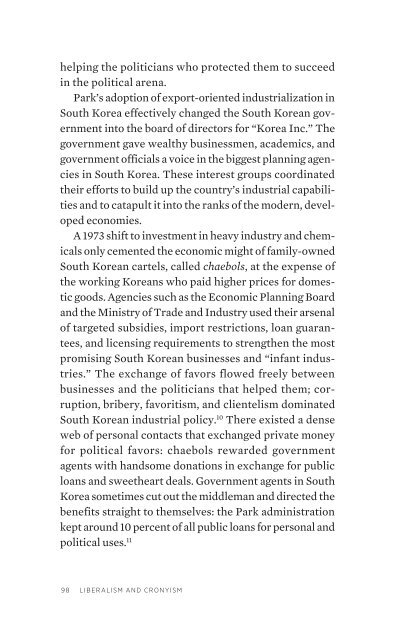url?sa=t&source=web&cd=1&ved=0CCYQFjAA&url=http://mercatus.org/sites/default/files/Holcombe_Cronyism_web
url?sa=t&source=web&cd=1&ved=0CCYQFjAA&url=http://mercatus.org/sites/default/files/Holcombe_Cronyism_web
url?sa=t&source=web&cd=1&ved=0CCYQFjAA&url=http://mercatus.org/sites/default/files/Holcombe_Cronyism_web
You also want an ePaper? Increase the reach of your titles
YUMPU automatically turns print PDFs into web optimized ePapers that Google loves.
helping the politicians who protected them to succeed<br />
in the political arena.<br />
Park’s adoption of export-oriented industrialization in<br />
South Korea effectively changed the South Korean government<br />
into the board of directors for “Korea Inc.” The<br />
government gave wealthy businessmen, academics, and<br />
government officials a voice in the biggest planning agencies<br />
in South Korea. These interest groups coordinated<br />
their efforts to build up the country’s industrial capabilities<br />
and to catapult it into the ranks of the modern, developed<br />
economies.<br />
A 1973 shift to investment in heavy industry and chemicals<br />
only cemented the economic might of family-owned<br />
South Korean cartels, called chaebols, at the expense of<br />
the working Koreans who paid higher prices for domestic<br />
goods. Agencies such as the Economic Planning Board<br />
and the Ministry of Trade and Industry used their arsenal<br />
of targeted subsidies, import restrictions, loan guarantees,<br />
and licensing requirements to strengthen the most<br />
promising South Korean businesses and “infant industries.”<br />
The exchange of favors flowed freely between<br />
businesses and the politicians that helped them; corruption,<br />
bribery, favoritism, and clientelism dominated<br />
South Korean industrial policy. 10 There existed a dense<br />
<strong>web</strong> of personal contacts that exchanged private money<br />
for political favors: chaebols rewarded government<br />
agents with handsome donations in exchange for public<br />
loans and sweetheart deals. Government agents in South<br />
Korea sometimes cut out the middleman and directed the<br />
benefits straight to themselves: the Park administration<br />
kept around 10 percent of all public loans for personal and<br />
political uses. 11<br />
98 LIBERALISM AND CRONYISM


